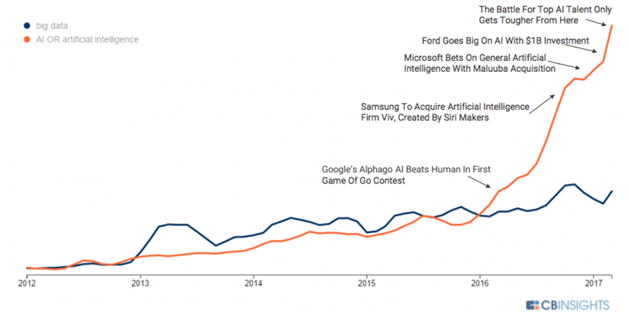The year – 1968
The Movie – 2001: Space Odyssey
This Stanley Kubrick masterpiece was the first popular film that grabbed public attention. With this film, Artificial Intelligence (AI) became a radical yet an achievable concept for sci-fi enthusiasts and inventors.
As 2017 rolled by, Artificial Intelligence spawned its own separate niche in the tech arena, as money in the field started trickling into innovation. The exponential rise in investments from $589 million in 2012 to $5 billion in 2016 corroborates that change in the investor sentiment. “People are starting to kick the tires, looking to see how it can help their business and the bottom line,” said David Schubmehl, the research director in AI for research firm IDC. “The return on investment evidence is not yet clear, but it’s starting to happen.”
Consequently ideas and thoughts about AI’s use range from skeptical to outright fanaticism. On one hand, notable scientists such as Stephen Hawking and Stuart Russell express their concern over AI’s looming threat to humanity. On the other, founders and investors are keen to utilize AI to solve the planet’s problems.
Investors, professors, and founders have expressed a sound representation of common opinions and reflected on the developments in the field. Despite that premise, AI is still at a nascent stage in terms of business deployment. Babak Hodjat, the co-founder and chief scientist at Sentient Technologies stated, “A lot of what AI is being used for today only scratches the surface of what can be done, it will become so ubiquitous that we won’t even call it AI anymore.”
That statement can be backed by the use of key developments in Artificial Intelligence ranging from Siri to Cortana, from Consumer AI to security ventures. And while there is a certain race among companies to capitalize on the AI hype, some companies are too interesting to miss out on.
In this list, we’ve featured the artificial intelligence companies apart from the usual tech magnates. Have a look at the upsides that we feel are noteworthy, and would possibly take great development strides in 2018.
OpenAI –
Founded by Elon Musk, this company created quite a lot of flutter after beating all star players in The International, a DoTA 2 gaming tournament. Marketed as Musk’s other ventures, OpenAI is a non-profit AI research company, discovering and enacting the path to safe artificial general intelligence.
The company has inspired a rather scintillating debate between investors and founders around the world. On the open-sourced build of AI, Rajat Khare, the founder of Luxembourg based Boundary Holding stated, “AI will not only make big data useful for governments and corporations but also normal individuals. It will transform the future”.

DeepMind –
Deepmind is a British AI company, which spawned AlphaGo and DQN-Atari. Ranked on top in terms of AI research, it spans most of the motherlode of AI and Machine learning fields.
There Reddit and Hacker News coverage is a testament to how well-respected they are within the tech community. Other than their epic fan-following, the company is also well-known for its research and its onslaught into conventional Turing tests and neural networks. Their goal, as their founder Demis Hassabis says, is to combine “the best techniques from machine learning and systems neuroscience to build powerful general-purpose learning algorithms.”
Hanson Robotics –
After developing the world’s first robot ‘citizen’, Hanson Robotics has become a familiar name in AI within the tech community. Its founder David Hanson is an American roboticist, who’s also the founder and Chief Executive Officer of Hanson Robotics. As ‘Sophia’, the robot made the media rounds after its launch, the company’s head expressed his outlook on AI, “I hope for super benevolent, super beneficial, super intelligence. So what this means is it has to understand the consequences of its actions on a very large scale, civilization scale.”
ViSenze –
ViSenze’s artificial intelligence technology works on a rather different tangent in AI. By recommending visually similar items to users when shopping online, ViSenze pulls its trajectory towards e-commerce and consumer-centric platforms. The company’s AI utilizes machine learning and computer vision algorithms, which process and analyze millions of visual content.
The company also distincts itself through its sphere of influence. Visenze’s main target of operation happens to be South East Asia and its dynamic consumer atmosphere. Across Southeast Asia, online retailers such as Asos, Rakuten and Zalora utilize the company’s AI technologies to usher an e-commerce revolution.
X.AI –
Described as ‘Driven by artificial intelligence and human empathy’, X.AI has pulled an enormous amount of PR through its direct attack on the niche of productivity. The New York-based startup is running on the parallel wave of AI powered virtual assistants like Apple’s Siri or Microsoft’s Cortana.
Chris Dyer, an assistant professor of computer science specializing in natural language processing at Carnegie Mellon University, commented on X.AI’s platform essentials, “There’s a general feeling in the field that by finding well-circumscribed domains, with rules that can be well-captured, fairly effectively, we might make some real progress.”
The company raised $10 million to respond to calls by its user community for the intelligent assistant to adopt new features and move beyond English-speaking markets. That apart the previous funding of $23 million has catapulted the startup amidst the most talked about in the United States.








